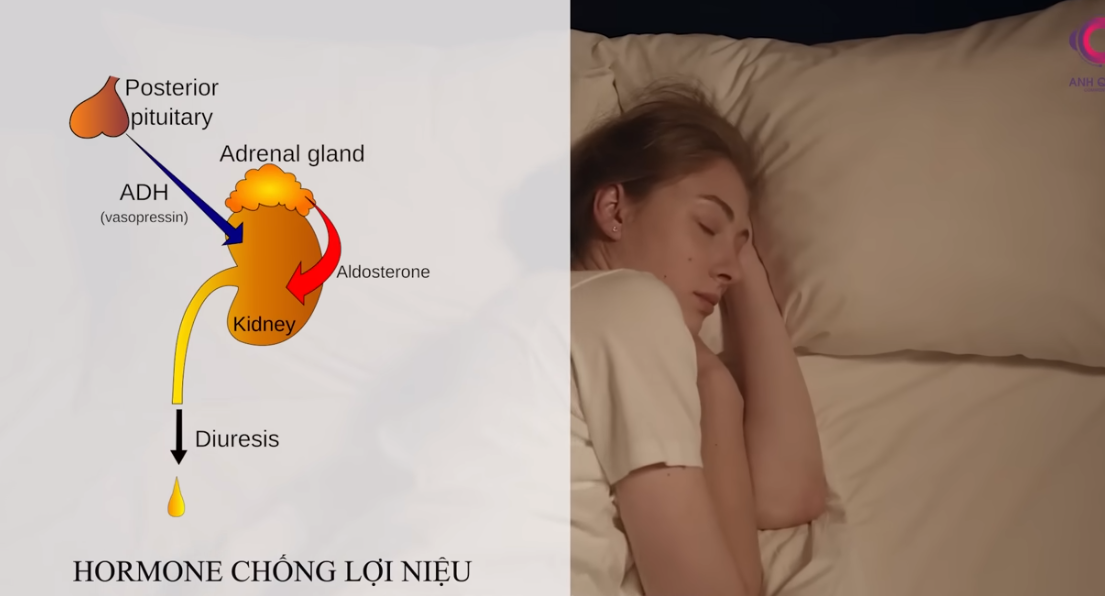Drinking the right amount of water every day will help your body feel less fatigued, keep your mind sharp, reduce constipation, prevent urinary tract stones, improve blood flow, keep your skin hydrated for a smooth complexion, and even limit our appetite to help with weight loss. Experts generally recommend that each person should drink 2 liters of water daily. Therefore, many of us always try to drink enough, even more than the recommended amount, but many mistakenly believe that this number applies to everyone. In reality, how much water one should drink depends on weight, age, and individual health conditions.
In 2023, a rare case occurred in the U.S. where ABC News reported that 35-year-old Ashley Sumer from Indiana died from water intoxication. The reason was that during family outings, Sumer felt severely dehydrated and drank nearly 2 liters of water in just 20 minutes. Medical experts noted that the woman's condition is called hyponatremia, a state when the sodium concentration in the blood is too low. Under normal conditions, sodium levels in the blood range from 135 to 145 mmol per liter. This ion coexists with chloride and bicarbonate primarily in extracellular fluid, playing a role in water balance and maintaining osmotic pressure for extracellular fluid.
Water intoxication can occur when you drink too much water in a short period, causing the water to dilute sodium in the body.

This causes a series of symptoms such as fatigue, headaches, and lack of concentration, and in severe cases, it can lead to coma or death. However, this is not a common condition and usually only occurs in extremely rare circumstances. It can happen after high-intensity sports competitions when people try to compensate for water loss due to sweating without replenishing enough salt or drinking an excessive amount of plain water in a short time, leading to a sharp decrease in blood sodium concentration, causing a sudden electrolyte imbalance, which poses a very high risk of death.
A similar incident occurred in 2008 in the UK when a 40-year-old woman named Jack Queen Henson died after drinking up to 4 liters of water in about two hours. She was following a strict weight loss program that required participants to drink a lot of water to create a false sense of fullness to curb appetite. The British Nutrition Association stated that drinking too much water in too short a time—here we are talking about several liters, not just coffee or other liquids—can affect kidney function, as it cannot eliminate the excess in the body in a timely manner, leading to a decrease in blood salt concentration, causing headaches or water intoxication.
Scientists analyze that the salt levels in the blood and body cells are usually the same, but if the blood suddenly becomes more diluted, it can cause cells, especially brain cells, to swell. This can create pressure in the skull, leading to headaches, and in severe cases, it can cause brain edema or water intoxication, which can be fatal. Another concerning symptom caused by excessive water intake is excessive sweating. Professor Marwell, a vascular surgeon and founder of the Wy clinic in London, believes that drinking too much water is related to many sweating issues that many people suffer from.
Every year, hundreds of patients are considered for sweat gland removal surgery, and in many cases, the cause stems from drinking too much water. He says one of the first things I always ask patients with pleurisy is how much water they drink each day, as they sweat excessively. They tell me they drink a lot of water to compensate for their bodies. When explained, patients are often surprised when I say their water-drinking habits may worsen their sweating. If you drink more water than you need, sweating is one way the body tries to rid itself of the excess. My patients often find they sweat less when they drink less water. Although it does not pose a serious health threat, excessive sweating often causes psychological lack of confidence.

Moreover, drinking a large amount of water, especially in the evening, can also affect our sleep. According to Professor Watley, when we sleep, our brain releases ADH, an anti-diuretic hormone, reducing kidney function and preventing us from feeling the need to urinate at night. But if you drink two or three glasses of water in the evening, the excess liquid affects ADH, filling the bladder, and you have to wake up to go to the bathroom, which significantly affects your sleep as it makes it hard for you to fall back asleep. The professor recommends not drinking more than 2 glasses of water three hours before bedtime. If you have trouble sleeping, Watley suggests taking a warm bath before bed, which will encourage you to sweat and lose water gently, reducing the need to wake up at night.
It should be clearly stated that drinking 2 liters of water a day is not a misconception; the mistake is applying it uniformly to everyone.
According to the advice of the UK's National Health Service, most adult women currently only need about 1.6 liters of fluid in total per day. A man needs about 2 liters to keep the body functioning efficiently. All types of drinks are considered fluids, including pure water, tea and coffee, milk, and fruit juices, and even water contained in foods like fruits and vegetables. David Wheeler, a professor of nephrology and spokesperson for the UK Kidney Research Institute, stated, "You really don't need to drink water to keep your body hydrated and your kidneys functioning. Fluids just need to be consumed in moderation to the extent that the body requires."

Nutritionist Dr. Franky Philip also agrees that water is a good drink providing necessary calories for the body. However, we should also balance the nutrients found in other liquids like milk, which contains calcium, and fruits, which contain vitamins, while avoiding sugary drinks as they can be high in sugar, which is not good for your waistline or teeth. Professor Watley states that guidelines show his concerns are accurate; recent studies from Sweden show that adults with normal lifestyles consume about 2.5 liters of fluid daily, with about 500 ml of that being metabolized from the foods we eat, such as fruits and vegetables. Adding a few cups of tea or coffee, milk in a bowl of cereal, or a little soup can meet your daily fluid needs.
Professor Watley continues that you do not need to drink more unless you are exercising or in a hot environment, where you will sweat more, which is why I think it is unnecessary to drink several liters of water throughout the day. In another study, nutrition experts specified that it depends on weight. For example, a person weighing 40 kg is recommended to drink 1.6 liters of water a day, while someone weighing about 50 kg will drink approximately 2 liters of water a day. In summary, an adult aged 18 to 50 without health issues is recommended to drink 40 ml of water per kg of body weight per day, while older adults will drink less, about 35 ml of water per kg of body weight per day. For even older individuals, the intake will decrease to 30 ml per kg of body weight per day.
Doctor Hưng explains that as we age, the metabolic capacity of organs like the heart and liver decreases, so the water requirement will also decrease. Additionally, some health conditions also limit water intake. The group of individuals who need to limit their water intake includes those with kidney and cardiovascular diseases, as they need to restrict the amount of water they take in to reduce pressure on these organs. Specifically, the kidneys play a crucial role in detoxifying a certain amount of waste that needs to be processed and excreted as urine. Therefore, doctors often suggest that healthy individuals drink plenty of water to reduce the risk of kidney stones. However, for those with weak kidneys, this solution is not suitable as kidney function is impaired, leading to poorer metabolic capacity.

Drinking a lot of water in a short time will increase the burden on the kidneys and worsen the situation similarly. If a person has heart disease, excessive water intake will increase pressure on the lungs, causing shortness of breath; in severe cases, the patient may experience wheezing or heart failure, which is life-threatening. If you have conditions like cirrhosis or liver fibrosis, you also need to control your daily water intake, as excessive water can cause abdominal fluid accumulation, leading to disrupted fluid circulation. However, this is general advice; for specific health conditions, it is essential to consult a specialist for the most appropriate recommendations for each individual.
The best way to know if we need to drink water is to feel thirsty.
If you are thirsty, you need to drink water; it's as simple as that. The amount of water we need to drink daily is not a fixed number of two liters, as this must depend on each person's constitution. Therefore, drink plenty of water for good health, but according to your individual ratio. Additionally, you can also rely on the color of your urine; ideally, urine should be light straw-colored. Dark urine means you are dehydrated and need to drink more. If your urine is light or almost clear, you are drinking too much water and need to reduce your intake a bit.
